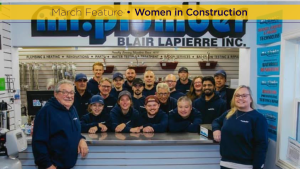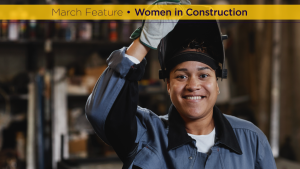Mandy Rennehan, known as the Blue-Collar CEO, is bridging the gap between the white-collar and the blue-collar worlds, elevating the respect society places on the skilled trades.
Rennehan, founder and CEO of Freshco, a full-service reconstruction and retail maintenance provider operating in Canada and the United States, said she wants to redefine “the collar blue” to help solve the skilled trade shortage in North America.
She was a speaker during the Canadian Apprenticeship Forum’s Supporting Women in the Trades Conference held recently in Halifax.
Both collars are needed, however there is a major imbalance and if it doesn’t change, the skilled labour shortage will only get worse, she noted.
“There has never been a true partnership between the two industries which is why nobody has ever really seen the ROI that that simulation would actually produce,” explained Rennehan, who is an entrepreneur, speaker, philanthropist and trade industry ambassador.
She said the white and blue-collar industries are segregated and don’t communicate. This is having a social and economic impact and the result is consumers are paying more and waiting longer for services. Companies also aren’t able to scale, and infrastructure projects are being delayed.
“You need somebody who is both collars to bridge. I am that bridge. I go in and I make big deals in a beautiful suit in a boardroom and then I navigate out onto a jobsite that same night making people better,” she said.
“I am explaining to them what everybody does and why they should care. I am also an advocate for a lot of the people in the white-collar industry that are doing wonderful things. But there really truly is a lack of comprehension of what everybody does and why us having this segregated has hurt us socially and from an economic standpoint.”
Rennehan left her hometown of Yarmouth, N.S. when she was 18 and founded Freshco when she was 19.
“I was an entrepreneur that is self-taught in maintenance and construction. I really did leave home with a dirty hockey bag, some ambition, and I just wanted to make money,” Rennehan recalled.
“I didn’t have time to go to school, I was poor, my parents needed money. Being female, and on top of it I was gay, how about that for a resume 23 years ago. I’ve never been discriminated against at all in the industry…because I don’t make it about my sexuality and I don’t make it about my gender. I was ambitious, and I had a different game. At the end of the day I made my customers look good and feel good and I made it about business.”
She said it is a misconception that white-collar jobs are more desirable than blue-collar occupations. She encourages youth to consider the trades the same way they consider white-collar jobs. Parents, teachers and guidance counsellors need to promote the skilled trades as well, she said.
“We are really not educating and marketing the industry for how amazing and innovative and trendy and sexy it is, to really bring in the other part of the world that have been told to go to university because that’s the prideful thing to do.”
She added, “I kept seeing how self-deprecating a lot of the people in this industry are and how their potential has never been brought out because they have only ever been told that the dumb kids go to community college and skilled trades college and the smart kids go to university.”
The trades have a lot to offer, she said.
“We’ve got work, we are building and maintaining the new Canada because we are a very new country,” Rennehen explained. “Our architecture and our buildings and our ability to be able to scale as a country has just begun. What we are seeing is that companies like mine can’t scale as much as I would like to because I just don’t have the talent.”
Her message is “don’t listen, don’t feel threatened by society and the bias towards university and do what you want to do.
“The skilled trade industry has always been generalized as being dirty and I am out there going, ‘it is everything else but dirty right now, and the parts of it that are dirty are amazing,’ ” Rennehen stated. “It’s been documented many many times how happy people are in this industry. They are happier than people that are sitting in a white-collar job.”











Recent Comments
comments for this post are closed